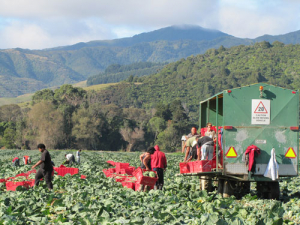Every quarter or eighth-acre of high-class land sold for housing or building is one more piece of land excluded from commercial vegetable growing.
That’s the view of John Seymour, the head of Horticulture New Zealand’s fresh vegetable section, who sees this aspect of urban sprawl as a huge challenge for his sector.
“There is an argument that says you just move somewhere else. But you can’t, because the crops are grown on class-one soil and there are very few places you can transfer that production to or if you do you get increased transport and freight costs,” Seymour told Hort News.
“A lot of people appreciate the problem, but for others in urban Auckland this is not an issue as long as there are fresh vegetables in their local supermarket.”
Seymour believes these people will say if you can’t grow it locally just import it from overseas. But there is a risk in doing this, he says.
“They don’t have the same regulations on food safety, etc.
“In the long term the assumption is that we will always be able to import; and that assumption is because there will always be countries that can export to us.
“But it’s possible, in the long term, those products won’t be available. For example, if China decides to feed its nation internally and stop exporting then suddenly you don’t have any supply.”
He says that from the consumer’s point of view it’s important to have commercial growing areas near cities, e.g. Christchurch, Nelson, Horowhenua (servicing Wellington and Manawatu), Hawkes Bay, Gisborne, Pukekohe and Northland (serving the Auckland market). Seymour points out that the closer commercial growing is to cities, the fresher and less expensive are the vegetables.
Then there’s the weather – outside growers’ control be it floods or drought, as is access to water -- becoming more complicated due to the RMA.
“Compliance costs increase every year and growers can’t directly pass these on. You can’t go to retailers and say, ‘well my costs have gone up because of compliance and we want 10% more’. This takes some growers out of the market because they can’t afford the compliance costs.
“I think people understand the logic that if the weather creates a shortage then prices will go up because more people are demanding the product. If there is only so much product on the floor to buy, retailers know that creates demand and some retailers are prepared to pay more than others because that’s the free market and consequently that flows on to the consumer.”
Seymour believes NZ has a strong fresh vegetable sector with a great product range by global standards. He says for 95% of the time all the products are available in supermarkets.
One encouraging trend he sees is strong demand from many consumers for fresh vegetables because they are healthy, and consumption of these products is growing.



















